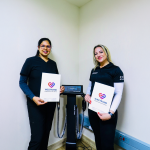
When we talk about healthy aging, living longer, stronger, and with more independence, protein stands out as one of the most powerful nutritional tools we have. It’s not just about muscle building. Protein plays a key role in preserving lean mass, supporting recovery, regulating appetite, and maintaining mobility as we age.
Research consistently shows that pairing adequate protein intake with regular exercise improves body composition and sets the foundation for long-term health.
Why Protein Matters for Body Composition
Body composition, the balance of lean mass to fat mass, offers far more insight into health than a simple number on the scale. Protein is at the center of maintaining that balance.
- Preserving lean muscle mass during weight loss: Protein helps maintain a healthy nitrogen balance, which signals whether the body is building or breaking down muscle tissue. Without enough protein, weight loss often comes at the expense of muscle.
- High-protein diets protect lean mass: Studies show that people who eat higher protein diets consistently preserve more muscle during weight loss compared to those on lower-protein diets. In fact, a review of 12 studies confirmed significantly better muscle preservation with higher protein intake.
Protein, Satiety, and Fat Reduction
Protein doesn’t just protect muscle, it also makes fat loss more achievable.
- It increases satiety, helping you feel full for longer.
- It curbs overall hunger, making it easier to maintain a calorie deficit.
High-protein diets have been linked to greater fat loss and better long-term weight management than lower-protein approaches. This dual effect, reducing fat while preserving muscle, reshapes body composition in a way that supports both metabolic health and resilience.
Protein for Recovery and Performance
Protein is also the cornerstone of recovery. After exercise, it drives muscle repair and growth, reduces soreness, and supports long-term performance gains. Beyond athletics, adequate protein helps preserve mobility, energy, and independence as we age, making it essential at every stage of life.
Protein and Aging: Overcoming Anabolic Resistance
As we grow older, our bodies respond less efficiently to protein, a phenomenon called anabolic resistance. This means older adults need more protein to achieve the same muscle-building effects.
Research suggests that consuming 1.6 to 2.4 grams of protein per kilogram of body weight per day is optimal for preserving lean mass. At the higher end of that range, protein intake paired with resistance training has been shown to accelerate fat loss, protect muscle, and support recovery, especially important during illness, rehabilitation, or periods of dieting.
The bottom line: protein isn’t optional as we age – it’s essential.
10 Simple Strategies to Increase Protein Intake
Getting enough protein is easier when you have go-to foods you enjoy. Here are some nutrient-rich options to include in your daily diet:
- Whey protein: Fast-digesting and rich in essential amino acids. Great in shakes, smoothies, or baking.
- Eggs: Six grams of protein each, plus healthy fats and vitamins.
- Greek yogurt: 15–20 grams per serving, perfect for breakfast or snacks.
- Chicken and turkey: Lean and versatile, with about 26 grams per serving.
- Beef and pork: Around 21–22 grams per serving, plus valuable minerals.
- Fish and shrimp: Protein-rich and packed with omega-3s for heart health.
- Cottage cheese: 28 grams per cup, ideal as a snack or blended into smoothies.
Putting It All Together
Protein is much more than a nutrient for athletes, t’s a foundation for healthy aging and vitality. By preserving lean muscle, supporting fat loss, and accelerating recovery, protein helps us move, perform, and thrive well into later life.
If you’re looking to optimize your intake, tools like the Evolt Active App can provide personalized protein targets tailored to your body composition, activity level, and goals.
As always, consult with a healthcare professional before making changes to your diet or training plan. But remember: prioritizing protein is one of the most effective ways to add years to your life and life to your years.
About the Author
Kylie Zimmerle, Research and Development Manager at Evolt, has dedicated her career to uncovering what truly drives health and fitness results. From founding a high-performing fitness RTO to serving ten years in Evolt’s R&D and competing as an Australian IFBB Figure Champion, Kylie brings deep expertise and lived experience to her work. She is passionate about making body composition clear and actionable, elevating muscle as a true “longevity organ,” and using tracking to guide better long-term health for everyone.
References
- Layman DK, Evans E, Baum JI, Seyler J, Erickson DJ, Boileau RA. Dietary protein and exercise have additive effects on body composition during weight loss in adult women. J Nutr. 2005 Mar;135(3):1903-10.
- Weigle DS, Breen PA, Matthys CC, Callahan HS, Meeuws KE, Burden VR, Purnell JQ. A high-protein diet induces sustained reductions in appetite, ad libitum caloric intake, and body weight… Am J Clin Nutr. 2005 Jul;82(1):41-8.
- Tarnopolsky MA. Protein and exercise. Curr Opin Clin Nutr Metab Care. 2007 Mar;10(2):142-9.
- Jäger, R., et al. International Society of Sports Nutrition position stand: Protein and exercise. J Int Soc Sports Nutr. 2017;14(20):1–25.
- Tang JE, et al. The effects of whey protein supplementation on exercise-induced muscle damage and recovery: A systematic review and meta-analysis. J Int Soc Sports Nutr. 2017;14(1):7.

